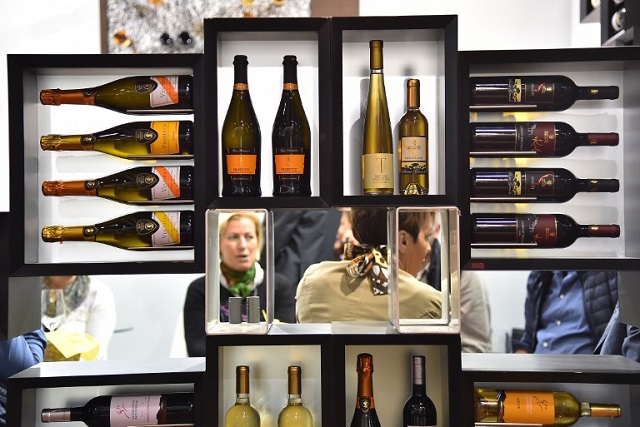“We are all very worried because the situation is very uncertain,” the chairman of one of Italy's best-known wine dynasties says of the implications of Britain leaving the European Union.
“We are only at the beginning of negotiations that will take two years and clearly could be influenced by factors from outside our world, political factors, whether that is in Britain, in Italy or in the rest of Europe.”
Cecchi is speaking at Vinitaly, a vast trade fair and get-together for industry insiders held every year in Verona.
READ ALSO: The 300-year-old story of what makes Chianti wine so special
With more than 4,000 exhibitors spread over almost 90,000 sq. metres and tens of thousands more buyers, reporters and amateur enthusiasts assembled, the vinous chatter never ceases.
And much of it this year has been about Brexit, less than a month after British Prime Minister Theresa May formally initiated divorce proceedings nobody in the wine world wanted.
Alex Canneti, a director of Berkmann Wine Cellars, a London-based importer, says his biggest fear is of food and drink becoming the focus for sniping that could sabotage hopes of a deal in the talks.
British Foreign Secretary Boris Johnson's recent warning that Italy would have to agree to free trade with Britain because it wanted to keep selling its Prosecco, was a case in point, he said.
“It was exactly what we were worried about. We just thought, 'Oh my God!'.”
Major market
Canneti told AFPTV he did not expect trade in areas such as banking services, nuclear technology or medicines to prove difficult.
“Whereas with things like cheese and wine, they might think 'we can use that to upset people',” he said.
“They know that, particularly in France, there are groups of vignerons that love burning trucks and getting angry. So it's a way of getting at Europe if Europe does not behave in the way the British would like them to.”
Apart from a recently-developed niche in posh sparklers, Britain has no wine production of its own.
But it has always been a thirsty place with deep pockets when it comes to booze, making it an influential player in the wine world.
Only the United States imports more and last year British imports from the other 27 EU states were worth 2.6 billion euros.
A nation of beer drinkers has become one that has embraced “Wine O'Clock” – the time-to-relax, early evening tipple that has helped to drive consecutive booms in the sales of Australian Chardonnay, Italian Pinot Grigio and, most recently, Prosecco, sales of which surged by a third last year.
Their success has made some wine-producing areas of Europe very exposed to the British market.
“Prosecco is huge, Rioja too. Bordeaux, Burgundy, Provence rose, you name it,” says Canneti.
No deal in the Brexit talks would mean EU wine potentially becoming subject to import duties while wine from Australia, New Zealand and South Africa could be coming in tariff-free if, as is expected, Britain moves quickly to negotiate new liberalizing trade deals with those countries.
Tax fears
Some say this will make little difference. All Chilean wine already enters Britain tax-free, as does a third of South African wine, under EU trading accords.
And the imposition of WTO-approved tariffs would add only 7-12 pence per bottle.
Not much if the bottle is from a top-end Bordeaux chateau, but it is equivalent to one to two percent of nearly all the wine sold in Britain, and such margins matter when the pound's slide is adding to upward pressure on prices.
“Clearly the level of (import) tax is a crucial element, particularly as duty on wine in Britain is already very high compared to other European countries,” Cecchi said.
“Honestly I am very concerned, above all because of the uncertainty. But we have to hope that good common sense prevails. Don't forget that the UK exports just over two billion euros of spirits to Europe, it is in everyone's interest to have a good deal.”
READ ALSO: Why Italy is mulling wine classes for schoolchildren
Importer Canneti echoes the sentiment, urging the negotiators on Brussels to do a quick deal allowing current computerised customs arrangements which mean “lorries come in and get checked through the border” are maintained.
“It is all done on the internet and it means there are no queues or complications.”
Canneti also highlights another, less obvious, risk of Brexit: an interruption in the flow of talented, well-educated youngsters from the continent into Britain's food and drink sectors.
“Particularly the young Italians who have come in over the last few years, they have brought a lot to the British economy and we have got a lot out of it.”
By Angus MacKinnon
Want more wine news? Head over to our dedicated wine section for the latest curiosities and features from the world of Italian wine
NOW READ: Italy has opened the country's first free wine fountain





 Please whitelist us to continue reading.
Please whitelist us to continue reading.
Member comments